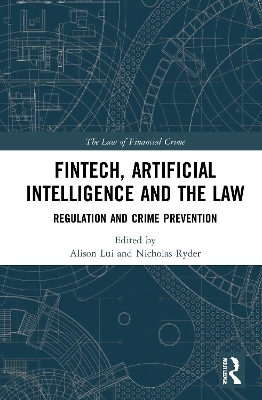
FinTech, Artificial Intelligence and the Law
Routledge (Verlag)
978-1-032-01246-9 (ISBN)
Focusing on crypto-assets, InsureTech and the digitisation of financial dispute resolution, the book examines the strategic and ethical aspects of incorporating AI into the financial sector. The volume adopts a comparative legal approach to: critically evaluate the strategic and ethical benefits and challenges of AI in the financial sector; critically analyse the role, values and challenges of FinTech in society; make recommendations on protecting vulnerable customers without restricting financial innovation; and to make recommendations on effective regulation and prevention of crime in these areas.
The book will be of interest to teachers and students of banking and financial regulation related modules, researchers in computer science, corporate governance, and business and economics. It will also be a valuable resource for policy makers including government departments, law enforcement agencies, financial regulatory agencies, people employed within the financial services sector, and professional services such as law, and technology.
Alison Lui is Reader in Corporate and Financial Law, Liverpool John Moores University, UK. Nicholas Ryder is Professor of Law, Bristol Law School, University of the West of England, UK.
Part 1
1. Introduction-Mind the Gaps
Part 2-The FinTech Ecosystem
2. Automation, Virtualisation, and Value
3. InsurTech’s Assurance – Value Research through an Array of ABCs
4. Improving the digital financial services ecosystem through collaboration of regulators and FinTech companies
5. Designing Social-Purpose FinTech: A UK Case Study
Part 3-Regulation of Cryptoassets and Blockchains
6. Should we trade market stability for more financial inclusion? The case of crypto-assets’ regulation in EU
7. Initial Coin Offerings: Financial Innovation or Scam
8. Cryptocurrency and Crime
9. Technology and tax evasion in the world of finance: an indispensable helping hand or a façade for crime facilitation?
10. The Bank of England’s approach to Central Bank Digital Currencies - Considerations regarding a native digital pound and the regulatory aspects
Part 4-Artificial Intelligence and the Law
11. AI, Big Data, Quantum Computing and Financial Exclusion: tempering enthusiasm and offering a human centric approach to policy
12. Risk of discrimination in AI systems: evaluating the effectiveness of current legal safeguards in tackling algorithmic discrimination
13. Unprecedented times: Artificial Intelligence and the implications for Intellectual Property
14. Towards a Responsible Use of Artificial Intelligence (AI) and Fintech in Modern Banking
| Erscheinungsdatum | 15.03.2022 |
|---|---|
| Reihe/Serie | The Law of Financial Crime |
| Zusatzinfo | 3 Tables, black and white; 7 Line drawings, black and white; 7 Illustrations, black and white |
| Verlagsort | London |
| Sprache | englisch |
| Maße | 156 x 234 mm |
| Gewicht | 453 g |
| Themenwelt | Recht / Steuern ► Allgemeines / Lexika |
| Recht / Steuern ► EU / Internationales Recht | |
| Recht / Steuern ► Wirtschaftsrecht | |
| Wirtschaft ► Betriebswirtschaft / Management ► Finanzierung | |
| Betriebswirtschaft / Management ► Spezielle Betriebswirtschaftslehre ► Bankbetriebslehre | |
| Wirtschaft ► Betriebswirtschaft / Management ► Unternehmensführung / Management | |
| Wirtschaft ► Volkswirtschaftslehre | |
| ISBN-10 | 1-032-01246-3 / 1032012463 |
| ISBN-13 | 978-1-032-01246-9 / 9781032012469 |
| Zustand | Neuware |
| Informationen gemäß Produktsicherheitsverordnung (GPSR) | |
| Haben Sie eine Frage zum Produkt? |
aus dem Bereich


